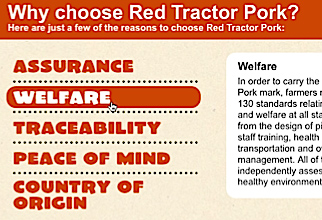
Oliver Thring’s Word of Mouth blog post in the Guardian focussed on the complaint made by Compassion In World Farming (Compassion) against the UK’s Red Tractor farmers’ label promoting itself as a welfare label in a national poster campaign last autumn.
Red Tractor pork is promoted by BPEX, a marketing body funded by pig levy payers in England. The familiar Red Tractor logo started life in the 1990s as an agricultural campaign to encourage consumers to buy British. That was as far as it went in the early years, but nationality is not a marker for welfare standards: intensive units have similar impacts wherever they are.
“Our argument with Red Tractor is that its minimum standards are not sufficient to justify the ‘high welfare’ claims it makes. Some Red Tractor pork will indeed come from high welfare farms, but not all. For example the Red Tractor standards allow for pigs to be kept on fully slatted floors which are uncomfortable for pigs to stand on and prevent them from expressing their natural rooting behaviour,” Compassion’s Senior Campaigns Manager Emma Slawinski told ARC.
“It is potentially detrimental to the farmers who are choosing to do higher welfare work, whether within Red Tractor or dedicated welfare schemes such as the RSPCA’s Freedom Foods, to allow a ‘high welfare’ label to be attached to pork that only meets the insufficient Red Tractor minimum standards.”
Compassion regards animals as sentient beings: the problems start when they are turned into units of production. “The cost of meat should reflect the full cost of the production system and its infrastructure,” Slawinski explains. “It is time for factory farming systems to look to their environmental and social impact, which is not currently accounted in the industrial economy.”





